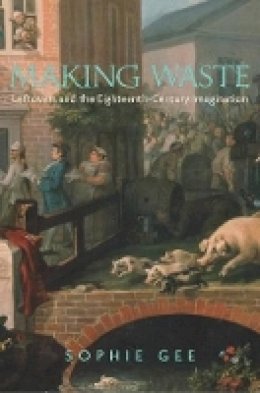
Stock image for illustration purposes only - book cover, edition or condition may vary.
Making Waste: Leftovers and the Eighteenth-Century Imagination
Sophie Gee
€ 57.38
FREE Delivery in Ireland
Description for Making Waste: Leftovers and the Eighteenth-Century Imagination
Hardback. Why was eighteenth-century English culture so fascinated with the things its society discarded? This book explains how English writers used contemporary theological and philosophical texts about unwanted and leftover matter to explore secular, literary relationships between waste and value. Num Pages: 216 pages. BIC Classification: 1DBKE; DSBD; HBJD1; HBTB. Category: (P) Professional & Vocational; (U) Tertiary Education (US: College). Dimension: 239 x 161 x 21. Weight in Grams: 454.
Why was eighteenth-century English culture so fascinated with the things its society discarded? Why did Restoration and Augustan writers such as Milton, Dryden, Swift, and Pope describe, catalog, and memorialize the waste matter that their social and political worlds wanted to get rid of--from the theological dregs in Paradise Lost to the excrements in "The Lady's Dressing Room" and the corpses of A Journal of the Plague Year? In Making Waste, the first book about refuse and its place in Enlightenment literature and culture, Sophie Gee examines the meaning of waste at the moment when the early modern world was turning modern. Gee explains how English writers used contemporary theological and philosophical texts about unwanted and leftover matter to explore secular, literary relationships between waste and value. She finds that, in the eighteenth century, waste was as culturally valuable as it was practically worthless--and that waste paradoxically revealed the things that the culture cherished most. The surprising central insight of Making Waste is that the creation of value always generates waste. Waste is therefore a sign--though a perverse one--that value and meaning have been made. Even when it appears to symbolize civic, economic, and political failure, waste is in fact restorative, a sign of cultural invigoration and imaginative abundance. Challenging the conventional association of Enlightenment culture with political and social improvement, and scientific and commercial progress, Making Waste has important insights for cultural and intellectual history as well as literary studies.
Product Details
Format
Hardback
Publication date
2010
Publisher
Princeton University Press United States
Number of pages
216
Condition
New
Number of Pages
216
Place of Publication
New Jersey, United States
ISBN
9780691139845
SKU
V9780691139845
Shipping Time
Usually ships in 7 to 11 working days
Ref
99-1
About Sophie Gee
Sophie Gee is assistant professor of English at Princeton University and the author of "The Scandal of the Season" (Scribner), a novel based on the story behind Alexander "Pope's Rape of the Lock". She writes regularly for the "New York Times Book Review", the "Washington Post", and the "Financial Times".
Reviews for Making Waste: Leftovers and the Eighteenth-Century Imagination
"This brief book on an unlikely topic is packed with insights. By focusing on 'waste,' Gee has found an original way to look at the literature of the Restoration and early 18th century... Best of all, she always writes clearly, making her book accessible even to beginners."
Choice "For a book concerned largely with filth, Making Waste is stylistically pristine. Gee writes with an elegance and fluency that buoys her thinking from one topic to the next... Rarely does criticism read so well."
Jonathan Kramnick, Studies in English Literature "Dazzling in its range of reference and implications, Making Waste springs to life like Swift's gaudy tulips, mixing memory and desire like lilacs bred out of the dead land, and inviting us to feast on the rich literary and theoretical harvest Ms. Gee has gleaned from the leftover."
Lynn Festa, Scriblerian
Choice "For a book concerned largely with filth, Making Waste is stylistically pristine. Gee writes with an elegance and fluency that buoys her thinking from one topic to the next... Rarely does criticism read so well."
Jonathan Kramnick, Studies in English Literature "Dazzling in its range of reference and implications, Making Waste springs to life like Swift's gaudy tulips, mixing memory and desire like lilacs bred out of the dead land, and inviting us to feast on the rich literary and theoretical harvest Ms. Gee has gleaned from the leftover."
Lynn Festa, Scriblerian
